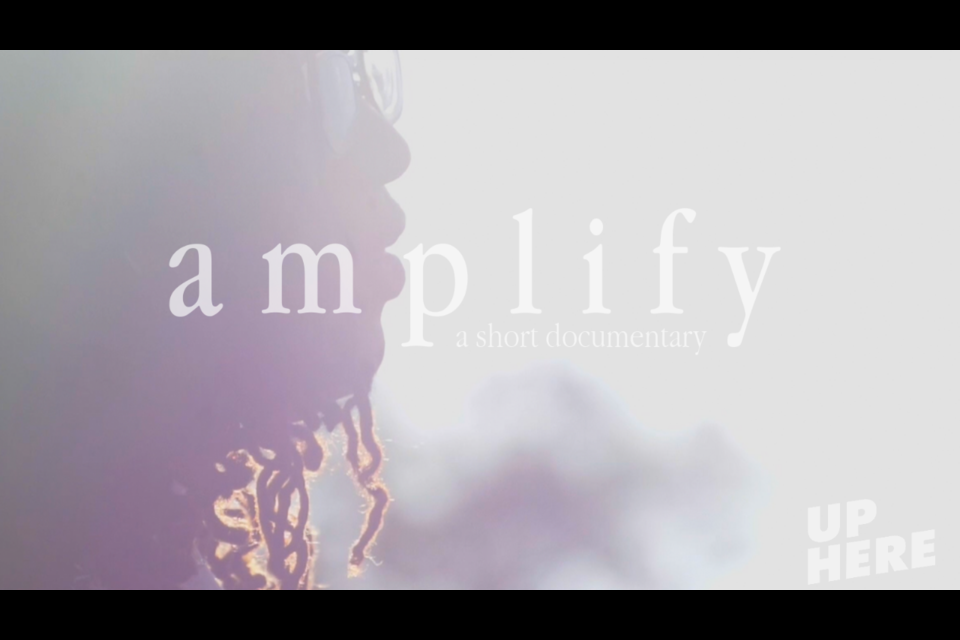When Isak Vaillancourt first began thinking of his short documentary, a project he would create with his team and the support of the guest curator of Up Here 6, Ra’anaa Brown, the global conversation on race had never been louder. At the time, it was shouting names like George Floyd and Breonna Taylor.
“People were suddenly realizing the urgency and validity of this movement,” said Vaillancourt. “Having difficult conversations in regards to their own complicity with systematic racism and their privilege. With the short documentary, I wanted to capture this unique moment in time from the perspectives of three Black community members here in Sudbury.”
In the opening shots of the film, an introduction reads: “Black communities are having conversations about race that never make it to mainstream media. The collective consciousness rarely lends itself to amplify these voices.”
With his documentary, Vaillancourt wanted to add new voices to the conversation. Not his, however: he decided to amplify the voices of three Black women in Sudbury and the struggles, racism and challenges to their own identity they have faced.
And he called it, Amplify.
Vaillancourt, a multimedia content producer and activist, is also from the area. He grew up in Chelmsford with his twin sister and younger brother, the children of a Franco-Ontarian father and a mother who found her way to Canada after leaving Somalia in 1991 to escape the civil war. He wanted to show that despite many believing that there are no issues with racism in Sudbury, the reality is quite the contrary.
“It’s important to realize that racism and discrimination exist in Sudbury, as much as we like to pretend that Canada is a nation of cultural tolerance.”
To him, the medium of a short documentary was the perfect choice to showcase his message. “We decided that a short documentary would be the perfect platform to shed light on the inequalities and discrimination that affects the lives of many racialized individuals here in Sudbury,” said Vaillancourt. “This project would not have been possible without the continuous support from the amazing team at Up Here. Behind the scenes, I worked very closely with my cinematographer, Shawn Kosmerly, and my editor, Riley McEwen, to bring this project to life.”
The documentary itself focuses on the lived experiences of the three Black women it features: Josephine Suorineni-Zaghe, Shana Calixte and Sonia Ekiyor-Katimi, and their thoughts in relation to the current political climate, racial inequality and social justice.
It is an opportunity for them to describe the challenges they have had to overcome and to educate those that perhaps have never had to consider the prejudice, both subtle and overt, that Sudburians of colour face.
It is a chance to understand that if you have not experienced something directly, rather than deny or deflect, you should defer.
“We as a society need to learn how to defer to people with lived experiences when speaking on issues that affect them directly,” said Vaillancourt. But also cautions, “Keep in mind that, amplifying Black, Indigenous, and POC (people of colour) voices does not mean placing the heavy burden on marginalized communities to educate you on the ways they’ve been oppressed. It’s the act of listening, self-reflection and continuous learning. It’s a commitment.”
As the film lives on, Vaillancourt hopes viewers will find ways to show this commitment by getting involved locally. He quotes Josephine Suorineni-Zaghe from the film and says “Build up the movement locally. Be there for Black children. Be there for Black girls and Black boys. Be there for the Black LGBTQ+ community and when you do have that interaction, you do see the immediate change.”
He also notes the many grassroots organisations that can benefit from more community involvement. “Within the City of Greater Sudbury, there has been a growing culture of community care and mutual aid all in the face of hatred,” he said. “This has not been cultivated by city officials but rather grassroot community groups such as Black Lives Matter - Sudbury, Sudbury Pride, Myth and Mirrors, SWANS Sudbury and The Sudbury Workers Education and Advocacy Centre (SWEAC) just to name a few. I encourage viewers to take the extra step and learn more about how they can uplift these organizations and the important work they're doing.”
The video is currently hosted by Up Here 6, and it is also available with French-language subtitles. For now, not only is Vaillancourt submitting this film to festivals, but he is currently working on multimedia projects that highlight “the amazing and diverse communities we have here in Sudbury.”
For more of Vaillancourt’s work, you can visit his website at IsakVail.ca.
Check out the trailer to the documentary here.
Jenny Lamothe is a Local Journalism Reporter at Sudbury.com, covering issues in the Black, immigrant and Francophone communities. She is also a freelance writer and voice actor.
